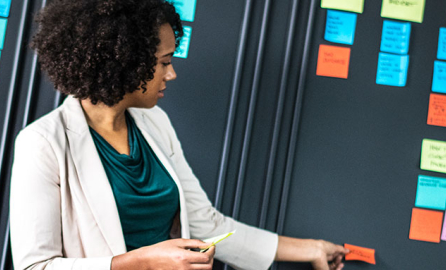Thanks in part to awareness campaigns like She is We, gender equality has become a key issue for the development community. This is particularly evident among the national development agencies, as many of them have adopted new rules and behaviours to mainstream gender in their everyday work.
The French Development Agency (AFD) is among these trendsetters, placing gender among its priorities for the upcoming years. We met with Rémy Rioux, the agency’s chief executive officer, to find out more about what this means in practice.
Making the mark
“The question of gender is a great priority for us,” Rioux told Capacity4dev at this year’s European Development Days. “It’s an absolutely crucial dimension for achieving social cohesion.”
The work starts with setting ambitious – and measurable – targets.
“We’re aiming to have fifty percent of our projects reach at least Marker 1 of the OECD Gender Equality Policy Marker and finance €700 million [worth] of projects with Marker 2 every year by 2022,” said Rioux.
| There are three types of Gender Equality Policy Markers: |
| Policy Marker 0 means the project has not targeted gender equality or it has not been evaluated against the gender marker |
| Policy Marker 1 implies that the project has set gender equality as a significant – but not the main – objective |
| Policy Marker 2 means gender equality is the project’s main objective, playing a fundamental role in its design and expected results |
| For more, visit OECD (PDF) |
The Marker is a tool used by the members of the OECD’s Development Assistance Committee (DAC) to record aid activities that target gender equality as a policy objective.
Setting targets in policy documents is an important step, but it’s not enough, Rioux added.
To achieve its objectives, AFD has put in place several mechanisms, including an executive committee that meets every two months to discuss social cohesion and gender issues. The regular meetings help ensure the topic remains high on the agenda, while a thematic unit spreads awareness about the new policy among staff and partners.
A basic concept for complex issues
At its core, gender equality is a relatively basic concept, but it carries significant consequences if not treated with sensitivity and adequate training.
What if the tools provided to farmers cannot be used by women because they are too heavy or hinder mothers from carrying babies on their backs? What if a water fountain is located too far from a village, putting women at risk of being sexually abused while trying to reach it by foot?
Remy Rioux on how AFD is mainstreaming gender throughout their programmes:
Addressing gender equality is not just about counting the number of women targeted by a project; development agencies’ staff needs to be trained on specific issues and made aware of how much is at stake.
“In our procedures, we support the project managers in taking gender issues on board thanks to our environmental and social support unit,” said Rioux.
Having support from the government is essential, too, and the process can work both ways.
“We evaluate our results and report them publicly to the government,” Rioux said. “As you know, president Macron has made gender equality one of the priorities of his national and international policies. So, AFD is able to show the progress made.”
Getting everyone on board
Convincing partners from the South is another key area, as working in silos doesn’t make sense for a challenge as global as gender equality.
“They have the authority, they know the country, the civil society, the political staff, [so] they have to advocate and find a way to improve the situation of women in their country,” Rioux said.
Spreading the word among key global policy makers is important, too. This, AFD does in its financing and also through the International Development Finance Club (IDFC), where Rioux is the chairperson.
IDFC brings together 23 of the biggest global and regional development banks, including Brazil’s Banco Nacional de Desenvolvimento Econômico e Social, the Development Bank of Southern Africa, Morocco’s Caisse des Dépôts et de Gestion and the China Development Bank.
“If we succeed in convincing them to take gender equality issues into account, we will have made great progress”
“Those institutions are well implemented in their countries and are sometimes as big as the World Bank; they can be very powerful,” said Rioux. “So, if we succeed in convincing them to take gender equality issues into account and to move their usual balance and activities a few centimetres closer to gender equality, we will have made great progress.”
One example of this kind of collaboration is AFD’s partnership with TSKB, Turkey’s Industrial Development Bank. One of the requirements for businesses to access loans funded by AFD and managed by TSKB is that they lead and implement a full gender equality policy in their organisation and with their employees.
Moving towards gender equality is therefore a sum of multiple and complementary activities, said Rioux. This includes having a strong policy that shows the path and measures the results, but also a way of ensuring that everybody – from the highest levels of management to the desk officers – is on board.
A serious internal training policy is crucial, too, Rioux added, as well as providing incentives and support for partners to help them understand the importance of the issue and implement gender sensitive activities.
This article was written by Virginie Ramey, with input from Capacity4dev's editorial team




Log in with your EU Login account to post or comment on the platform.